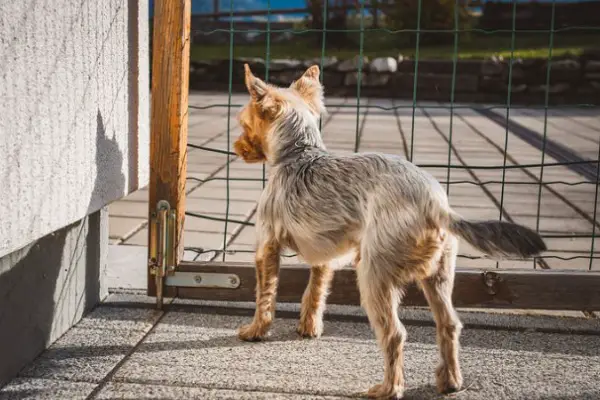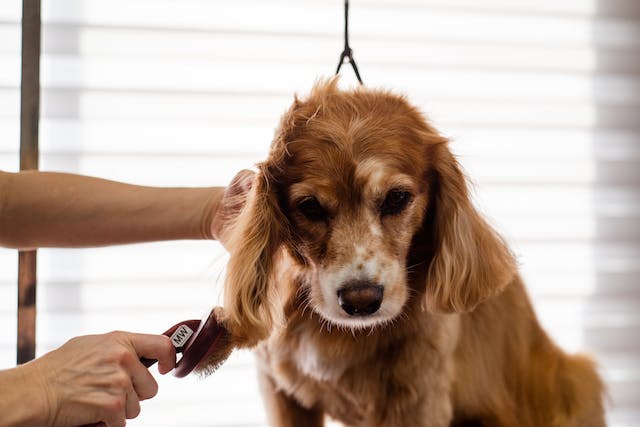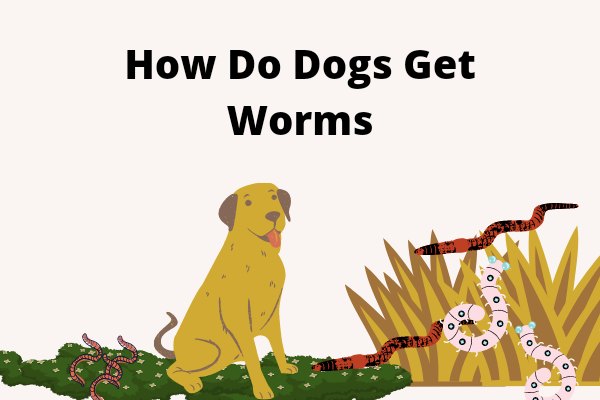9 Common Yorkie Anxiety Symptoms & Fix

Yorkies are known to be prone to separation anxiety, but what are some common Yorkie anxiety symptoms you should know? Keep reading!
I will keep things very simple as much as possible in this post, I will highlight some common causes of anxiety in Yorkies.
I will also highlight some common ways to fix or prevent anxiety but first let me quickly discuss the most common Yorkie anxiety symptoms you should know.
Yorkie Anxiety Symptoms
You should be aware of the following frequent Yorkie anxiety symptoms:
1. Changes in personalities
This is one of the most common ways to identify Yorkies anxiety, as there will be changes in your pup’s temperaments.
You will notice your sweet pup staying away from things he loves and becoming more aggressive towards everything.
There will be increased barking and unwanted behaviors such as freezing, biting, scratching, and chewing valuables.
Adding changes in temperaments or personalities to other Yorkie anxiety symptoms in this list should give you a clear understanding that your Yorkie is suffering from anxiety.
2. Increased excessive barking behavior
Anxiety in Yorkies leads to increased excessive barking behavior, you should know that Yorkies on their own love barking.
So when stressed or suffering from anxiety you will always notice a high-pitched tone of unnecessary barking.
This type of barking differs from your usual type of barking that can be due to excitement or a stranger in your environment.
Even though barking is one of the Yorkies’ behavior problems, increased barking can be traced to anxiety.
3. Excessive licking behavior
Yorkies lick everything, but excessive lip licking is a common sign of nervousness in the breed.
Your dog may also try to relax by licking their lips or yawning, and these habits are significant symptoms that your dog is stressed.
Your Yorkie may lick her lips and yawn when she is nervous. When they’re savoring a nice reward, it’s usually a slower lick.
When your Yorkie is agitated, he may lick his lips and yawn. It’s generally a slower lick than when they’re enjoying a tasty treat.
It can also seem like a “flick,” in which the tongue comes out and then returns without actually licking the lips.
4. Destructive chewing of things
Even though Yorkies are little, they chew objects as a sign of worry.
Chewing is a totally typical activity for dogs of all ages including Yorkies. It depends, though, on what they’re chewing and why they’re chewing.
Chewing for Yorkies is a fun way to pass the time while also relieving moderate tension and stress.
When your Yorkie starts eating objects that aren’t meant to be chewed, keep an eye on their anxiety level.
5. Increased whining and pacing
If your Yorkie is agitated or nervous, he may whine at any time.
The whining is generally followed by pacing if the stressor is something your Yorkie can’t get away from, like as loud noises.
Otherwise, your Yorkie can be crying and sitting about for no apparent reason.
If your Yorkie isn’t crying because he has to go outdoors or is in pain, it’s most likely stress.
When dogs are stressed, they frequently lose control of their whining, which is a natural response.
When your Yorkie begins to pace back and forth, it means something is disturbing them and they are unable to relax.
If your Yorkie shows this behavior on a regular basis, you might be able to figure out what’s making them nervous.
6. Panting and cowering
Even if it is not hot outside, an anxious Yorkie will pant excessively, which is a significant signal of worry.
Make sure your Yorkie isn’t overheated (even if it’s freezing outside and she’s wearing a sweater!).
If she isn’t panting because of the heat, she is agitated or concerned about something.
When a Yorkie is stressed, he or she will want to get away from the person’s hands and find a safe spot to hide.
They may try to hide beneath furniture or crouch at your feet with their body stooped over, ears down, and tail tucked.
If they are being held, some Yorkies may even duck beneath their owner’s arm.
7. Increased aggressive behavior
Aggression is one of the most prevalent reasons Yorkie owners seek professional help for their dogs.
It’s likely that your generally placid Yorkies are reacting to their worries by becoming aggressive or snippy.
Aggressive behavior in Yorkies is a serious issue that you should address immediately with your veterinarian.
8. Shivering or shaking
Many small dog breeds or pets, including Yorkies, shiver when they are scared, anxious, or feel cold.
This trembling is often accompanied by a tucked tail, cowering, and other stress-related actions, all of which are signs of worry.
If your Yorkie is shivering despite the fact that it isn’t cold outdoors or indoors, it might be due to anxiousness.
Similarly, if any medical issues have been checked out, your Yorkie is most likely suffering from anxiety.
In Yorkies and other small dogs, shivering is a sign of fear or anxiety, although there are other reasons for Yorkies shaking.
9. Frequent potty accidents when left alone
Frequent potty accidents, when left alone or unattended, are one of the most common Yorkie anxiety symptoms you should keep in mind.
When you come home and notice your Yorkie is not doing his business in the usual place then you should be worried.
When Yorkies are stressed it leads to anxiety which can quickly turn to frustration causing your Yorkie to poop where he is not supposed to.
If things keep going on or repeat themselves, then you should look at your Yorkie anxiety level and fix it.
Find out more on what to do if you have to leave your Yorkie alone at home.
Causes of Yorkie anxiety
Here are some of the most common causes of anxiety in Yorkies you should know:
- Leaving Yorkies alone unattended for too long.
- Constant changing of daily routine.
- Fear of being home alone.
- Abandonment by owner.
- Loud noises.
- Frequent changes in mealtimes.
- A stressful or traumatic event.
- Being around strange people.
- Birth of a new child.
- Bringing in a new pet.
- Poor socialization
- Change of location.
- Too much stress.
Ways to fix Yorkie anxiety
Consult your veterinarian for the best treatment options for anxiety.
Your veterinarian can assist you in determining the sort of anxiety your Yorkie is experiencing, as well as the potential reasons and triggers.
Your veterinarian can also help you assess if your Yorkie’s nervousness is merely situational or has developed into a serious problem.
Veterinary professionals can also rule out any other medical disorders that may be causing your Yorkie’s symptoms.
Your veterinarian will assist you in developing a treatment strategy.
Because a multitude of variables can create excessive anxiety, the best method to manage it is typically through a mix of training, preventive tactics, and, in some circumstances, drugs.
Here are some common ways to help fix or prevent Yorkie anxiety:
1. Create a stress-free environment for Yorkies
Create a relaxing environment for your Yorkie to help them overcome anxiety.
Ideally, you should carry the same bed, blanket, or mat with you whenever you visit a potentially stressful region.
Reward relaxing activities on the mat on a frequent basis, even when stress levels are low, to help your Yorkie link the mat with relaxation.
This gives them a safe place to go when they leave the house, go to the vet, or are confronted with anxiety triggers.
2. Establish a daily routine for Yorkies
Create a walking, gaming, and eating routine. Your Yorkie will be more at ease since he will always know what to expect.
This means your Yorkie will never be bored since he will always have something to do.
3. Counter-conditioning of Yorkie
Teaching your Yorkie to regard triggers or pressures as positive rather than negative is known as counter-conditioning.
When the trigger happens, give your Yorkie something enjoyable to do so that they look forward to it rather than fear it.
The goal of counter-conditioning is to modify your Yorkie’s response to the anxiety-inducing stimuli by substituting a more desired behavior, like sitting or focusing on the owner, for the anxious or aggressive behavior.
The owner gradually introduces the cause of fear to the dog, preferably in little doses and at a lower intensity.
Exposure to fear on a regular basis and rewarding positive conduct can go a long way toward reducing anxiety.
4. Invest in some antianxiety products
Your veterinarian can assist you in determining the sort of anxiety your dog is experiencing, as well as the potential reasons and triggers.
Your veterinarian can also help you assess if your dog’s nervousness is merely situational or has developed into a serious problem.
You may always invest in anti-anxiety products to assist your Yorkie cope with anxiety.
Here are a few examples of common anti-anxiety medications:
- Using CBD Oil for Dog Anxiety.
- Antianxiety beds
- Dog anxiety jacket
- Dog-calming collar.
5. Exercise and play with Yorkie more
The brain of your Yorkie is kept engaged by providing diverse stimuli, releasing energy, and interacting with other dogs.
Participate in sports with your Yorkie if they are naturally enthusiastic, like agility training.
You’ll strengthen your ties while also benefiting your and their health.
However, be cautious when playing with your Yorkies since they might overheat and have respiratory problems.
I hope with the information provided on this page your question about Yorkie anxiety symptoms was answered.



![Head Trauma in Dogs [Signs, Causes & Treatment] Head Trauma in Dogs](https://petcreeks.com/wp-content/uploads/2023/12/pexels-mikhail-nilov-7469230.jpg)

![Dog Traumatized After Boarding [Full Explanation] Dog Traumatized After Boarding](https://petcreeks.com/wp-content/uploads/2023/04/Dog-Traumatized-After-Boarding-768x555.jpg)
